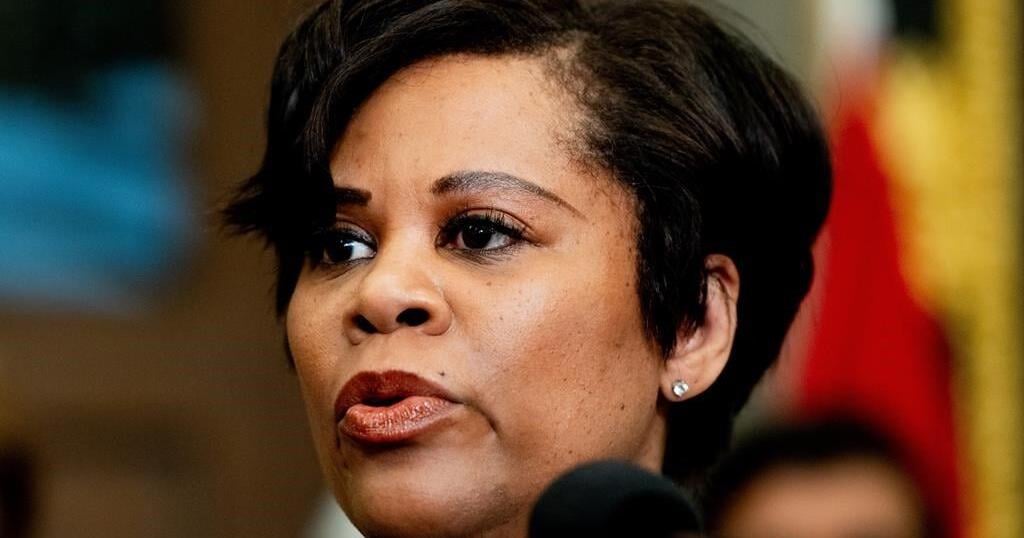EDMONTON – Alberta Premier Danielle Smith says she wants to depoliticize the debate around upcoming legislation affecting transgender youth, but a federal minister says that’s not possible.
Marci Ien, the federal Liberals’ minister for gender equality, says creating the legislation itself is a political act.
“In Canada, the freedom to be who you are isn’t about politics — it’s a right,” Ien said in a social media post directed at Smith on Tuesday.
“As a lawmaker, you should know that.”
Ien’s comment came hours after Smith posted a video online saying those who consider Alberta’s new policies harmful are misguided.
The United Conservative Party premier added she wants forthcoming debate on the proposed legislation, which is to be introduced when the house reconvenes later this month, to be mature and compassionate.
Ien extended an offer to meet with Smith to discuss the legislation further and said the sweeping changes being proposed could threaten lives.
In a statement to The Canadian Press, Smith didn’t say whether she would meet with Ien but that the new policies are being created to “protect children and ensure any life-altering decisions are being made as an adult.”
“We want to make it clear that we will continue to ensure that every Albertan who identifies as transgender is supported and that their rights are protected,” said Smith.
Carolyn Svonkin, a spokesperson for Ien, said Wednesday that Smith has not replied to the offer to meet.
The proposed legislation, announced online by Smith in January, seeks to prohibit those under 18 from undergoing gender affirmation surgery and those under 16 from accessing puberty blockers and hormone therapy.
Smith has said those 16 and 17 can access puberty blockers and hormone therapy but only after a physician, psychologist and parents have agreed.
Mark Holland, Canada’s health minister, joined Ien in expressing concern.
“Health-care decisions, including gender affirming care, should be made between families and their doctors.” Holland wrote on social media.
“Premier Smith’s plan to prohibit these health procedures outright will have an impact on the health of children and their families, and limit doctors’ options when they are trying to make the right health decisions for their patients.”
The UCP government’s planned legislation would also require parental approval if students 15 or younger want to use different pronouns or names at school. Parents of those 16 and 17 would still have to be notified.
It would also require parents to opt in for lessons touching on sexual orientation and sexual and gender identity. Currently, parents have the ability to opt out. As well, the education ministry would have to approve any third-party teaching material on those subjects.
The legislation would also prohibit transgender women from participating in competitive women’s sports leagues but not recreational or coed competitions.
Many organizations have condemned the policies, including Amnesty International Canada, the Canadian Association for Elizabeth Fry Societies, the Canadian Centre for Policy Alternatives and Pride societies across the province.
Victoria Bucholtz, a transgender woman and member of the group Queer Citizens United, said Smith and her UCP government have not listened to the transgender and queer community, only a fringe minority.
The easiest way for Smith to depoliticize the policies would be to do nothing, Bucholtz said.
“Abandon these policies and turn this back over to parents, teachers and health-care professionals who deal with the trans community,” said Bucholtz. “This video shows … that she is aware that there’s a huge amount of opposition to what she’s doing.”
Alberta Opposition NDP Leader Naheed Nenshi said he thinks Smith’s call to depoliticize is an attempt to escape criticism and that Smith is the one responsible for politicizing the lives of transgender youth.
“If she really wants to protect these trans kids then she should stop playing politics with their lives,” he said.
The Alberta government is looking to insert itself into the doctor-patient relationship, said Kristopher Wells, the Canada Research Chair for the public understanding of sexual and gender minority youth.
“For the government to attempt to get in the way between a physician and their patients and put ideology instead of evidence in the doctor’s room is completely unconscionable,” said Wells, who was recently appointed to the Senate by Prime Minister Justin Trudeau.
“Why is the provincial government so obsessed with the bodies of trans children? It’s just this weird obsession that they just can’t seem to get over.”
This report by The Canadian Press was first published Oct. 2, 2024.
— With files from Aaron Sousa
